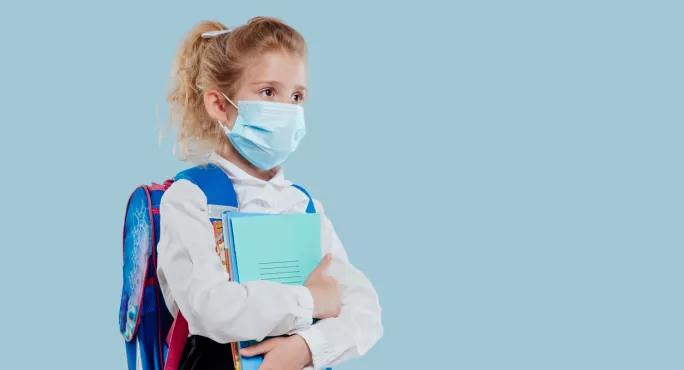- Home
- Face masks are just a distraction from what matters
Face masks are just a distraction from what matters

Amid the many F-words deployed during the Covid-19 crisis, few of us expected “face masks” to become such a significant - and polarising - example.
The context for this week’s media frenzy was a World Health Organisation report, a decision by the Scottish government, and a fairly predictable policy twist by the government in Westminster. This, in a nutshell, gives schools in England the flexibility to expect the wearing of face coverings in communal areas - or not, depending on their circumstances.
While that seems a reasonable decision to me - given that there are pros and cons to face masks, and every school has its own context - not everyone agrees.
Some would have liked to see the wearing of face coverings in communal areas made mandatory across all educational institutions. Anything else, they argue, pushes an unreasonable decision about a public-health issue on to the shoulders of headteachers and their governors.
I see that, too. It’s what I mean by polarising.
A distraction from what matters
All of this is a perfectly valid debate of course, but what is disturbing is some of the reactions that heads are receiving to policies on face masks. I hear far too many stories of leaders who are getting online or email abuse because they are (a) insisting on face masks being worn, or (b) not insisting on face masks being worn.
And it is proving a distraction from the much more important matters in hand, such as welcoming children back to school, assessing where they are, and planning the next steps in their learning.
Teachers are experts in this. And all the work they have been doing towards creating some semblance of educational normality - all the logistical arrangements and pedagogical preparation - isn’t getting the airtime it deserves.
Instead, every hour seems to bring a fresh spate of headlines, plus a full-blown row now raging in Wales, about face masks.
But perhaps this is not really a row about face masks at all, and what has happened is that this subject has become a proxy for the anxiety that surrounds the reopening of schools in general.
Bruising results season
And, as my inbox constantly reminds me, there is a lot to be anxious about.
Pupils and staff are returning following an extended shutdown triggered by a pandemic. Schools have had to put in place a complex set of safety controls. Many children will require extra support to help them catch up with lost learning, and schools will have to juggle this while delivering the normal curriculum. Some of these children will be fearful, unsure, and out of the habits of classroom learning.
If this were not bad enough, the experience of results season over the past couple of weeks has been absolutely bruising. The failings of the statistical algorithm that was meant to standardise the results left A-level students distraught, led to another government U-turn, and created a trail of chaos that is not over yet.
Reverting to centre-assessed grades was the least-worst option in the circumstances, but there is continuing dismay about how this decision may itself have created inconsistency and injustice. You can read more about that here.
The response of the government has been woeful. Two senior civil servants have left their posts, but ministers remain unscathed, and important questions remain unanswered.
What exactly went wrong, why were the flaws in the statistical model not foreseen, and why were ministers apparently not on top of this vital issue?
A catastrophic failure
We have witnessed a catastrophic failure of both process and governance. Pupils, parents, teachers, taxpayers all deserve to know who knew what and when.
It is surely right and reasonable to expect the government to commission an independent review, not least in order to learn the lessons from this debacle, in case next summer’s exam season is disrupted (for which, by the way, there is still no Plan B in the event that this happens).
So, as a final summer bank holiday heaves into view, there is plenty to be anxious about, and plenty more to be angry about.
But what is remarkable in all this is that, whenever I see a school leader being interviewed on the radio or television - and this happens quite a lot at the moment - they radiate optimism, positivity and an absolute commitment to reopening their schools and making it work.
And when I talk to leaders, away from the glaring lens of Skype or Zoom, many are certainly battered by experience, but are quietly and determinedly getting on with getting it right, and are quick to credit the support of their staff. Their attention to detail is in stark contrast to some of our senior politicians.
Which leads to this conclusion. It has not been a good few weeks, and there will be many more difficulties to come. School leaders and teachers haven’t been well supported by the government, or by some sections of the media, but they are well supported by one another, and by the majority of the public.
And when all this is one day over, it will be their professionalism, their expertise, and their quiet public service that will shine through.
So: have faith, good luck, and let’s hope that the current F-word soon becomes just another passing detail, as we open schools and colleges once again to welcome back with relief and joy our children and young people.
Keep reading for just £1 per month
You've reached your limit of free articles this month. Subscribe for £1 per month for three months and get:
- Unlimited access to all Tes magazine content
- Exclusive subscriber-only stories
- Award-winning email newsletters



